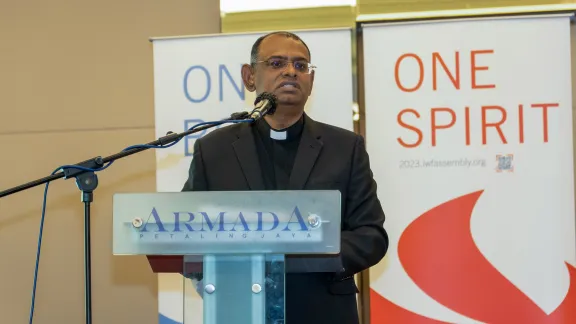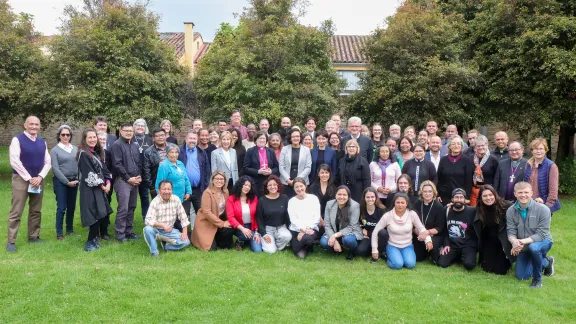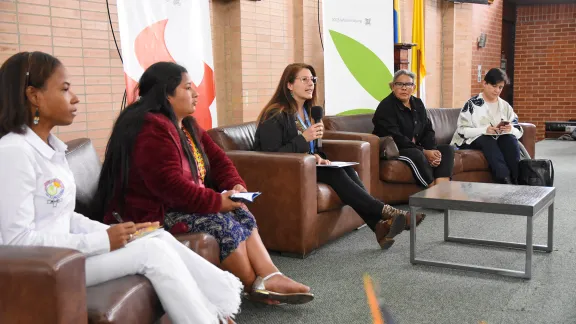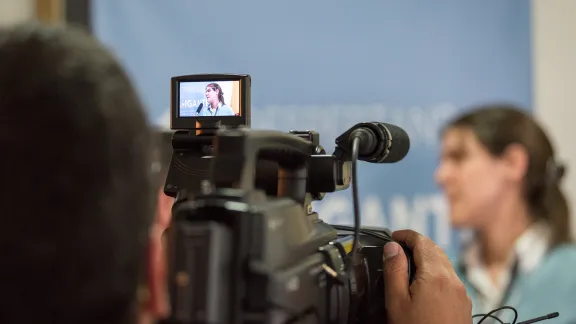Asia: Witnessing to Christ in a minority context in Malaysia
The General Secretary of the Council of Churches in Malaysia spoke to the delegates of the Asia Pre-Assembly, explaining the current situation of the Christian minority in the country and how it strives to give credible witness in the public space.

General Secretary of the Council of Churches in Malaysia, Rev. Jonathan Jesudas, addressing the delegates of the Asia Pre-Assembly. Photo: LWF/Jotham Lee
General Secretary of the Council of Churches in Malaysia addresses Asia Pre-Assembly
(LWI) - Formed in 1948, the Council of Churches of Malaysia (CCM) is one of the first ecumenical bodies in Malaysia. As a member of the Christian Federation of Malaysia (CFM), it works “to be the uncompromising collective voice of Christians in the nation,” said CCM General Secretary Rev. Jonathan Jesudas. He spoke at the Asia Pre-Assembly in Kuala Lumpur, Malaysia, on “Witnessing Christ in a minority context”.
“It is not just on the causes of the Christian community alone that CFM intervenes, issues statements, or engages with relevant governmental and non-governmental bodies. It is for Malaysian society as a whole, for the betterment of civil society,” Jesudas said.
Rev. Jonathan Jesudas is a pastor of the Tamil Methodist Church and has been the General Secretary of the CCM since 2022.
Malaysia is a predominantly Muslim country, with about 60 percent of the population belonging to that religion. Buddhists follow with about 20 percent, and Christians with just over 9 percent.
Religion in the public space
“Multi-ethnic and multi-religious Malaysians have lived together, largely in peace and harmony and prosperity with peaceful changes in government, for over 65 years in what is constitutionally a secular country,” Jesudas said. “But God features significantly in Malaysian personal, social and political life and discourse.”
According to the Malaysian Federal Constitution, Islam is the religion of the Federation, but other religions may be practiced in peace and harmony throughout the Federation. In addition, the Constitution states that every person has the right to profess and practice their religion.
Speeches and official functions often begin with an Islamic greeting and sometimes even a doa selamat, which is a prayer for God’s protection. “God and the invocation of God are pervasive in Malaysia,” Jesudas said. “Nevertheless, God, religion, Christianity, and Christ, in particular, are politically charged and highly politicized issues in many nations of Asia and Africa. Malaysia is no exception.”
Nevertheless, the “leadership, caliber and commitment of Christian politicians have brought much renewal and competency to the government,” Jesudas said. But “it is not easy being a Christian minister or politician in a minority context.”
Christian faith and churches
“Christians in Malaysia have remained a little flock, hovering below 10 percent of the population for many years,” said Jesudas. “The growth of Chinese churches by outreach is therefore remarkable and encouraging. There also has been some growth in the churches of the indigenous people. Church growth of people of Indian origin in Malaysia has been slow, with much protest and challenges from Hindu groups. But outreach to people coming to work in Malaysia has been fulfilling, especially among the Nepalis, Myanmarese, Indians and other nationalities.” The 2020 Malaysian Census puts the number of foreigners working in the country at about 2.5 million persons, but it is estimated the actual figure is higher.
Schools and education
Schools and universities are vital spaces for people to come into contact with the Christian faith. “There are many non-Christians in Malaysia who can say the Lord’s prayer, have read the Bible, sat for Bible knowledge examinations and are familiar with Christian literature and practices through attending Christian mission school,” said Jesudas. “Christmas is widely celebrated among many Malaysians, whether they are Christians or not.”
“Christian teachers, Convent sisters, La Salle brothers, and Christian school principals have made Malaysia what it is now – a land of tolerance, love and respect for one another,” Jesudas said. “Christian teachers, chaplains, leaders and members of Christian fellowships in schools, colleges and universities have also led many young people to the Lord through their lifestyle, faith and love.”
Jesudas, therefore strongly appealed “for a larger number of Christian youths to choose teaching as their vocation.”
“We need more committed Christian teachers and lecturers for primary schools, secondary schools, colleges and universities,” he said. The presence of such teachers “has made a major difference for many Christian leaders of Malaysia today.”
Jesudas noted that opportunities to provide Chaplains, chapel services, Bible knowledge classes and Christian fellowships in government schools should be well used. “However, it is in establishing Christian private schools and colleges where the best Christian education can be provided. Hence the need to set up more Christian private schools and colleges providing education at a reasonable cost in the country.”
“If our Christian schools can re-establish their pre-eminence as premier institutions of learning, producing leaders of integrity, caliber and excellence, the church’s task to be the light of the world would be much closer to realization,” he said.
Medical mission and welfare
“Many churches in Malaysia have medical missions, a significant form of witnessing in a minority context,” Jesudas said. An example was the Klinik Lutheran, established in 2007, in the Ipoh region. The Ministry of Health approved the license for this Clinic to run as a charitable organization providing health care to the community’s people. “In collaboration with various voluntary doctors, staff nurses and pharmacists from private hospitals and clinics, Klinik Lutheran can provide free healthcare services to the public.”
Interfaith engagement
In a multi-religious and multi-ethnic country such as Malaysia, interfaith engagement is vital. “The CFM also works with the Malaysian Consultative Council of Buddhism, Christianity, Hinduism, Sikhism and Taoism (MCCBCHST) on interfaith concerns for engaging with the government on policies, social issues, and concerns,” Jesudas said. Also, some Muslim NGOs work directly with CFM or through the MCCBCHST on wider national issues. “The Lord has enabled Christians in Malaysia to be united in witness among people of other faiths through this avenue,” Jesudas said.
“With imagination, commitment, and inspiration of the Lord, the Church can organize itself to be the light and salt of the earth,” Jesudas said. “A great cloud of Christian witnesses has gone before us in the schools, in parliament, and in society. By God’s grace, it is possible for Christians to be strong and vibrant witnesses in a minority context.”
The Asia Pre-Assembly takes place in Kuala Lumpur, Malaysia, from 14-18 June 2023. The Thirteenth Assembly of the Lutheran World Federation takes place 13-19 September 2023 in Krakow, Poland. The theme of the Assembly will be “One Body, One Spirit, One Hope”. It will be hosted by the Evangelical Church of the Augsburg Confession in Poland.


